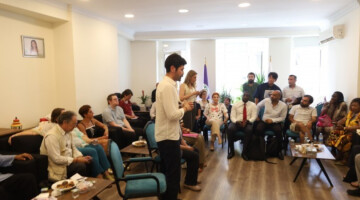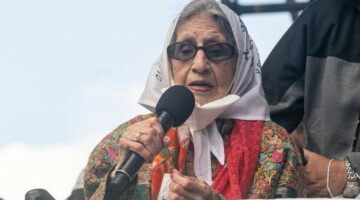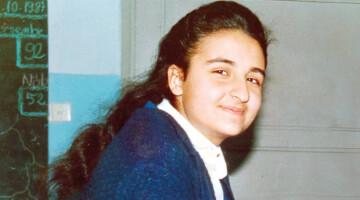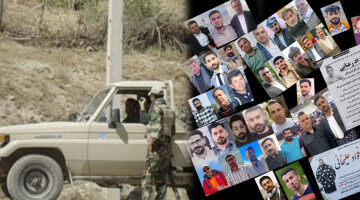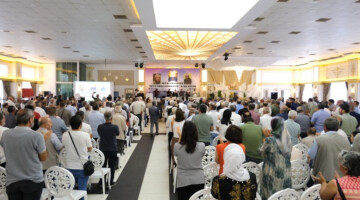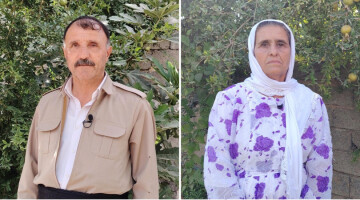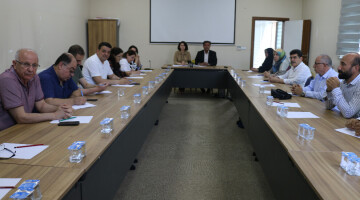Kobanê Rebuilding Coordination Member Abdurrahman Hemo stated that works for the reconstruction were continuing and that the basic needs of the city have been met to a large extend. Hemo added that second phase in the reconstruction works has begun.
Works of reconstruction in the war-torn town of Kobanê, West Kurdistan, has recorded a major progress since the liberation of the town from ISIS gangs in late January. While the basic needs of the tens of thousands of people who have returned home soon after its liberation have been met, including water, road and sewerage system, the town has been cleared of ISIS corpses, while disinfection has also been practiced to avoid probable harms by the remaining wastes. Reconstruction works continue with great determination and will in spite of the attempts of hindrance by the gangs and their supporters.
Speaking to ANF, Kobanê Rebuilding Coordination Member Abdurrahman Hemo told that the joining of the cantons of Kobanê and Cizirê will also accelerate the reconstruction.
RECONSTRUCTION COMMENCED IN AMED
Recalling that Kobanê Rebuilding Coordination was founded soon after the liberation on 27 January, with an aim to determine, photograph and record the damage and devastation in the town, Hemo said the reconstruction process was commenced with the Amed conference held on 2-3 May which witnessed a discussion and decision-making as to which ground and model the town would be rebuilt.
Hemo remarked that the Coordination consisted 3 members from South Kurdistan, 2 from East Kurdistan, 3 from North Kurdistan, 2 from Europe, and 5 from West Kurdistan. He noted that the members were in constant touch with each other and led a joint work.
WATER, ROAD AND SEWERAGE SYSTEM
Hemo remarked that as part of their works, they firstly worked to determine the basic needs of the town, adding; "In the first place, we needed to bring water to the town. We repaired the destroyed water supply network, and provided water to the 50 percent of the town. The sewerage system which had also been destroyed by ISIS attacks was also fixed simultaneously. The streets and roads of the town were cleared and opened back. Our works in this field are still continuing."
Reminding that the water need of the town had previously been met from the Euphrates river, Hemo said water access to the town was enabled through water wells after ISIS gangs cut this line. He said they can't enable water access to a part of the town yet.
Hemo stated that the water, road and sewerage needs of the city have been met to a large extend by now, and that all these works have been performed thanks to the support of North Kurdistan municipalities.
CLEANING WORKS
Pointing out that cleaning works in the town were also going on, Hemo continued; "Soon after the battle, we cleared the town of ISIS corpses on the streets and among the ruins. We gathered around 900 ISIS corpses, while many others among the debris which we couldn't reach were rendered ineffective by means of disinfection in consideration of disease they could have spread. This work was performed by the Disinfection Committee."
DEBRIS REMOVAL, HOUSE AND MUSEUM BUILDING
Hemo said that works for debris removal have begun as the second step of reconstruction, and that people will start building houses after the completion of these works.
Hemo said that a 20-hectare field, the Culture and Art Center and surrounding area, has been designated for the museum to be built in the town. Remarking that houses of many Kobanê inhabitants remained within these boundaries, Hemo said; "The People's Assembly, the Law Committee and the Canton Administration are conducting a joint work for this. A new neighborhood and houses will be built in a 150-hectare area for the residents whose houses are located within this area, and everything will be done to avoid their victimization. The master plan of this project has also been done. A reconstruction work will be performed in accordance with the culture and philosophy of Kobanê and the Kurdish people."
4 THOUSAND HOUSES FELL INTO RUIN
Hemo stated that one other work they exercised was to locate the demolished houses, noting that 4 thousand houses in the town fell into ruin during the battle. Remarking that over 110 thousand people have turned back home since the liberation, he said everyday life was going on in the town center and villages.
ADVANTAGE OF UNITING WITH CIZÎRÊ
Hemo pointed out that uniting with the canton of Cizîrê will also accelerate the reconstruction works in Kobanê, adding; "The oil, food and humanitarian aid delivered from Cizîrê has influenced the life in Kobanê positively. The aid to be delivered into the town from now on will be a powerful factor to enhance the reconstruction process in Kobanê. Before the liberation of Girê Spî, all the aid would come from North Kurdistan, which at the same time brought along some difficulties. With the present opportunities, reconstruction will gain speed."
THEY WANTED TO RESTRAIN REBUILDING IN KOBANÊ
Hemo emphasised that supporters of ISIS gangs wanted to restrain the progress achieved in reconstruction works and normalization in a short time, adding; "The treacherous attack launched on June 25, which was also participated by the intelligence agencies of some states, aimed to restrain these works of ours. Yet, nothing will ever be able to hinder the reconstruction and will of our people in the town. We will build a new life."
KEEP THE SUPPORT FOR KOBANÊ GOING
Calling out to international institutions and establishment to promote this process and carry it to achievement, Hemo called for solidarity against attacks and attempts of massacre targeting Kobanê and Rojava.






